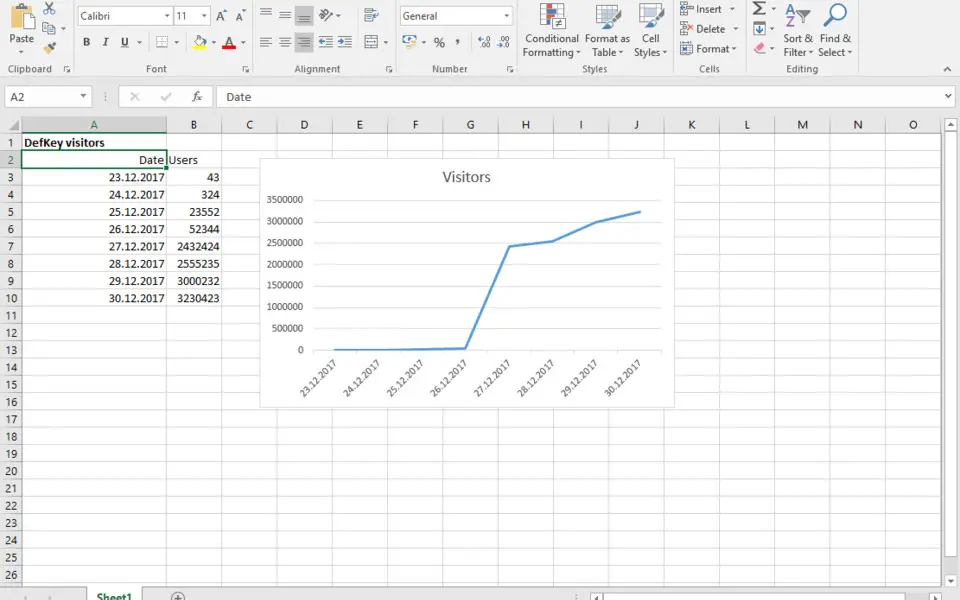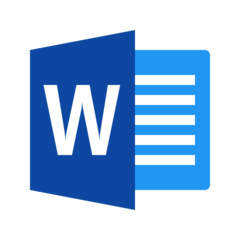|
|
Close a workbook |
||
|
|
Open a workbook |
||
|
|
Go to the Home tab |
||
|
|
Save a workbook |
||
|
|
Copy |
||
|
|
Paste |
||
|
|
Undo |
||
|
|
Remove cell contents |
||
|
|
Choose a fill color |
||
|
|
Cut |
||
|
|
Go to Insert tab |
||
|
|
Bold |
||
|
|
Center align cell contents |
||
|
|
Go to Page Layout tab |
||
|
|
Go to Data tab |
||
|
|
Go to View tab |
||
|
|
Open context menu |
||
|
or
|
|||
|
|
Add borders |
||
|
|
Delete column |
||
|
|
Go to Formula tab |
||
|
|
Hide the selected rows |
||
|
|
Hide the selected columns |
||
|
|
Create names from selection |
||
|
|
Advanced filter |
Advertisement
|
|
then enter the search term: Open the Tell me box on the Ribbon and type a search term for assistance or Help content |
||
|
|
Open the File page and use Backstage view |
||
|
|
Open the Home tab and format text and numbers and use the Find tool |
||
|
|
Open the Insert tab and insert PivotTables, charts, add-ins, Sparklines, pictures, shapes, headers, or text boxes |
||
|
|
Open the Page Layout tab and work with themes, page setup, scale, and alignment |
||
|
|
Open the Formulas tab and insert, trace, and customize functions and calculations |
||
|
|
Open the Data tab and connect to, sort, filter, analyze, and work with data |
||
|
|
Open the Review tab and check spelling, add comments, and protect sheets and workbooks |
||
|
|
Open the View tab and preview page breaks and layouts, show and hide gridlines and headings, set zoom magnification, manage windows and panes, and view macros |
|
|
(to move to a different tab, use access keys or the arrow keys) Select the active tab of the ribbon, and activate the access keys. |
||
|
|
To move to a different tab, use access keys or the arrow keys. Select the active tab of the ribbon, and activate the access keys. |
||
|
|
Move the focus to commands on the ribbon |
||
|
or
|
|||
|
|
Move among the items on the Ribbon |
||
|
|
Activate a selected button |
||
|
or
|
|||
|
|
Open the list for a selected command |
||
|
|
Open the menu for a selected button |
||
|
|
When a menu or submenu is open, move to the next command |
||
|
|
Expand or collapse the ribbon |
||
|
|
Open a context menu |
||
|
or
|
|||
|
|
Move to the submenu when a main menu is open or selected |
|
|
Move to the previous cell in a worksheet or the previous option in a dialog box |
||
|
|
Move one cell up in a worksheet |
||
|
|
Move one cell down in a worksheet |
||
|
|
Move one cell left in a worksheet |
||
|
|
Move one cell right in a worksheet |
||
|
|
Move to the edge of the current data region in a worksheet |
||
|
|
Enter End mode, move to the next nonblank cell in the same column or row as the active cell, and turn off End mode. If the cells are blank, move to the last cell in the row or column |
||
|
|
Move to the last cell on a worksheet, to the lowest used row of the rightmost used column |
||
Advertisement |
|||
|
|
Extend the selection of cells to the last used cell on the worksheet (lower-right corner) |
||
|
|
Move to the cell in the upper-left corner of the window when Scroll Lock is turned on |
||
|
|
Move to the beginning of a worksheet |
||
|
|
Move one screen down in a worksheet |
||
|
|
Move to the next sheet in a workbook |
||
|
|
Move one screen to the right in a worksheet |
||
|
|
Move one screen up in a worksheet |
||
|
|
Move one screen to the left in a worksheet |
||
|
|
Move to the previous sheet in a workbook |
||
|
|
Move one cell to the right in a worksheet. Or, in a protected worksheet, move between unlocked cells |
||
|
|
and then the |
||
|
|
Exit the floating shape navigation and return to the normal navigation |
||
|
|
Open the Format Cells dialog box |
||
|
|
Format fonts in the Format Cells dialog box |
||
|
or
|
|||
|
|
Edit the active cell and put the insertion point at the end of its contents. Or, if editing is turned off for the cell, move the insertion point into the formula bar. If editing a formula, toggle Point mode off or on so you can use arrow keys to create a reference |
||
|
|
Add or edit a cell comment |
||
|
|
Open the Insert dialog to insert blank cells |
||
|
|
Open the Delete dialog box to delete selected cells |
||
|
|
Enter the current time |
||
|
|
Enter the current date |
||
|
|
Switch between displaying cell values or formulas in the worksheet |
||
|
|
Copy a formula from the cell above the active cell into the cell or the Formula Bar |
||
|
|
Move the selected cells |
||
|
|
Copy the selected cells |
||
|
|
Paste content at the insertion point, replacing any selection |
||
|
|
Open the Paste Special dialog box |
||
|
|
Italicize text or remove italic formatting |
||
|
or
|
|||
|
|
Bold text or remove bold formatting |
||
|
or
|
|||
|
|
Underline text or remove underline |
||
|
or
|
|||
|
|
Apply or remove strikethrough formatting |
||
|
|
Switch between hiding objects, displaying objects, and displaying placeholders for objects |
||
|
|
Apply an outline border to the selected cells |
||
|
|
Remove the outline border from the selected cells |
||
|
|
Display or hide the outline symbols |
||
|
|
Use the Fill Down command to copy the contents and format of the topmost cell of a selected range into the cells below |
||
|
|
Apply the General number format |
||
|
|
Apply the Currency format with two decimal places (negative numbers in parentheses) |
||
|
|
Apply the Percentage format with no decimal places |
||
|
|
Apply the Scientific number format with two decimal places |
||
|
|
Apply the Date format with the day, month, and year |
||
|
|
Apply the Time format with the hour and minute, and AM or PM |
||
|
|
Apply the Number format with two decimal places, thousands separator, and minus sign (-) for negative values |
||
|
|
Open the Insert hyperlink dialog |
||
|
|
Check spelling in the active worksheet or selected range |
||
|
|
Display the Quick Analysis options for selected cells that contain data |
||
|
|
Display the Create Table dialog box |
||
|
or
|
|
|
Select the entire worksheet |
||
|
or
|
|||
|
|
Select the current and next sheet in a workbook |
||
|
|
Select the current and previous sheet in a workbook |
||
|
|
Extend the selection of cells by one cell |
||
|
|
Extend the selection of cells to the last nonblank cell in the same column or row as the active cell, or if the next cell is blank, to the next nonblank cell |
||
|
|
Turn extend mode on and use the arrow keys to extend a selection. Press again to turn off |
||
|
|
Add a non-adjacent cell or range to a selection of cells by using the arrow keys |
||
|
|
Start a new line in the same cell |
||
|
|
Fill the selected cell range with the current entry |
||
|
|
Complete a cell entry and select the cell above |
||
|
|
Select an entire column in a worksheet |
||
|
|
Select an entire row in a worksheet |
||
|
|
Select all objects on a worksheet when an object is selected |
||
|
|
Extend the selection of cells to the beginning of the worksheet |
||
|
|
Select the current region if the worksheet contains data. Press a second time to select the current region and its summary rows. Press a third time to select the entire worksheet |
||
|
or
|
|||
|
|
Select the current region around the active cell or select an entire PivotTable report |
||
|
|
Select the first command on the menu when a menu or submenu is visible |
||
|
|
Repeat the last command or action, if possible |
||
|
|
Undo the last action |
|
|
Select an entire PivotTable report |
||
|
|
Edit the active cell and put the insertion point at the end of its contents. Or, if editing is turned off for the cell, move the insertion point into the formula bar. If editing a formula, toggle Point mode off or on so you can use arrow keys to create a reference |
||
|
|
Expand or collapse the formula bar |
||
|
|
Cancel an entry in the cell or Formula Bar |
||
|
|
Complete an entry in the formula bar and select the cell below |
||
|
|
Move the cursor to the end of the text when in the formula bar |
||
|
|
Select all text in the formula bar from the cursor position to the end |
||
|
|
Calculate all worksheets in all open workbooks |
||
|
|
Calculate the active worksheet |
||
|
|
Calculate all worksheets in all open workbooks, regardless of whether they have changed since the last calculation |
||
|
|
Check dependent formulas, and then calculate all cells in all open workbooks, including cells not marked as needing to be calculated |
||
|
|
Display the menu or message for an Error Checking button |
||
|
|
Display the Function Arguments dialog box when the insertion point is to the right of a function name in a formula |
||
|
|
Insert argument names and parentheses when the insertion point is to the right of a function name in a formula |
||
|
|
Invoke Flash Fill to automatically recognize patterns in adjacent columns and fill the current column |






What is your favorite Microsoft Excel 2019 hotkey? Do you have any useful tips for it? Let other users know below.
1098606
493800
409256
359110
302586
273321
10 hours ago
14 hours ago
14 hours ago Updated!
1 days ago
1 days ago Updated!
3 days ago Updated!
Latest articles